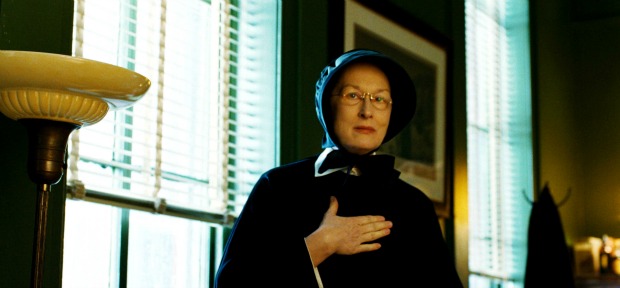Doubt
Doubt contains a fiercely strong cast, well capable of meeting the demands of a character-driven tale of morality and manipulation.
Plot summary
A Catholic school principal questions a priest's ambiguous relationship with a troubled 12-year-old student.

Written and directed by John Patrick Shanley, and adapted from his award winning play, Doubt contains a fiercely strong cast, well capable of meeting the demands of a character-driven tale of morality and manipulation. Set in 1964, Doubt takes place in a private Catholic school where the newly arrived Father Flynn (Philip Seymour Hoffman), a vivacious and charismatic priest, is attempting to modernise the school’s methods. In direct opposition to his informal style, and the sexist views of the church, is the modest yet draconian Sister Aloysius (Meryl Streep). The arbitrator between the two is the magnificently amusing and naïve Sister James (Amy Adams), who’s story, it appears, we are following for the first half of the film – viewing the actions of the other characters in stolen glances and conversations. When an incident involving the school’s first and only black student is brought to the attention of Aloysius by James there is a dynamic shift and, although still operating in incidents half seen and assumptions made through the conversations, Shanley takes a more sinister approach with skewed camera angles and direct confrontation, bringing the fantastic conflict between Streep and Hoffman to the fore.
The transition from stage to screen becomes apparent through the unconventional lack of climax surrounding insinuations made, such as what really happened between the child and Father Flynn. The tension is not undermined, however – the emotional engagement remains until the end as the truth is never given completely, either visually or verbally, leaving our moral judgements for the final scene. That said, Shanley does not show any other distinct flair, and while the film is largely held up by superb performances from the cast the pace falters from time to time, and some of the sound and visual analogies appear quite patronising. It feels as though Sister James is abandoned having fulfilled her duty in establishing a middle ground with regards to morality, somewhat deflating given the attachment to her innocence. This decision is easily forgiven with the introduction of Mrs. Miller (Viola Davis) as the child’s mother. Her role provides a much needed kick, with an incredible performance that upsets the balance and perhaps provides a very harsh reality and wake up call for Aloysius with her alarmingly conflicting character.
The final 10 minutes of the film fail to deliver, perhaps based on the simmering tension throughout, giving no real release or satisfaction but remaining firmly on the side of the ambiguous. Streep’s story does well to carry the film through its final stages but causes much aggravation as a result when it limps across the finish line. The film is worth seeing on the merit of the performances alone, but for any fulfilment it is best to look elsewhere.











COMMENTS